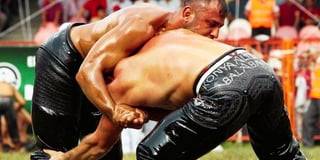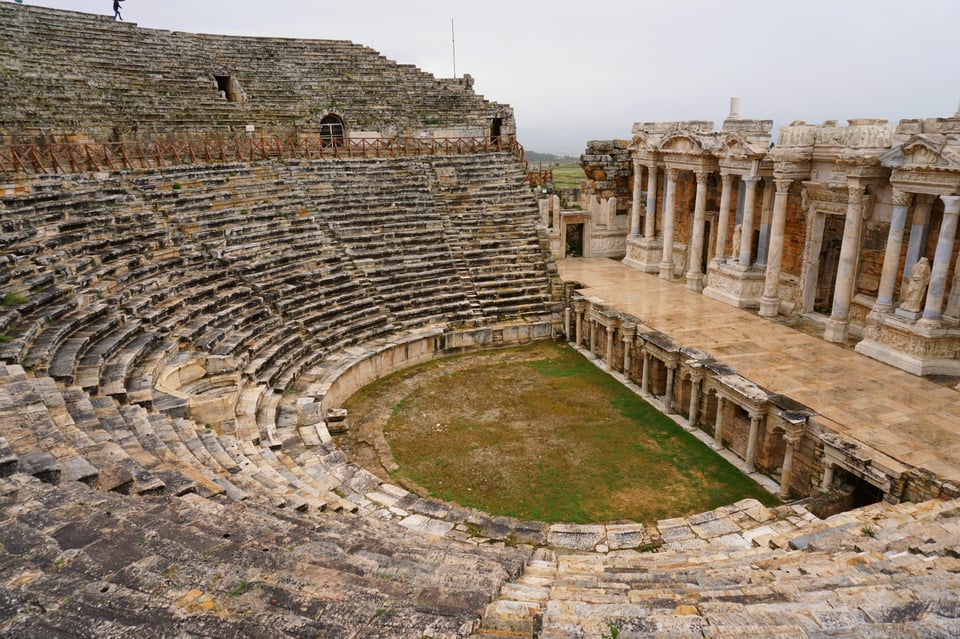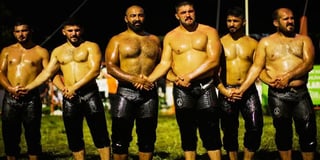A Comprehensive Guide to Turkish Oil Wrestling: Unveiling its Fascinating Traditions and Techniques

Turkish Oil Wrestling, also known as Yagh Gures, is the national sport of Turkey and is considered one of the oldest sports in the world. In this comprehensive guide, we will delve into the rich history, traditions, techniques, and rules of Turkish Oil Wrestling, providing you with a deep understanding of this captivating sport. If you require any further information or require assistance, please do not hesitate to contact the Turkey Visa helpdesk. Our team is readily available to provide you with guidance and support.
History of Turkish Oil Wrestling
Turkey, with its long history and rich cultural heritage, has been the birthplace of various sporting traditions. Turkish Oil Wrestling has its origins dating back to the 14th century. Legend has it that Suleiman Pasha and his group of 40 Ottoman warriors established a camp in a village called Samona. It was during their stay that two wrestlers engaged in a wrestling match that lasted from dawn until midnight, resulting in their tragic demise due to exhaustion. This legendary match marked the birth of the KirkPinar oil wrestling festival.
Since 1924, the Kirk Pinar tournament has been held annually in Edirne, a city located on the borders of Bulgaria and Greece. While the location may have changed over time, the significance of this tournament remains deeply rooted in the hearts of the Turkish people. In 1995, the 624th edition of the festival took place, highlighting the tournament's ancient and revered status.

Before the Game
Prior to the commencement of the three-day competition, a grand procession featuring dancers and dignitaries parades through the streets of Edirne. The esteemed honor of carrying the flag is bestowed upon the previous year's champion wrestler, known as the "Bash Pehlivan." Wreaths are laid in remembrance of all the wrestlers who have competed before, and prayers are offered for the souls of the deceased wrestlers.
Meanwhile, at the stadium, anticipation builds as massive crowds gather to witness the forthcoming action. Inside the arena, the competitors prepare themselves for the ultimate battle.
Preparation and Attire
Turkish oil wrestling, also referred to as Yala, entails wrestlers donning special leather trousers called "kisbet." These trousers are crafted from calf hide or water buffalo leather. The area below the knee, known as the "patcha," is layered with pieces of felt placed beneath the leather and tightly fastened. Around the waist, wrestlers secure the "kasnak" using a rope.
These preparations serve a specific purpose: to make it exceedingly challenging for opponents to gain a grip on one another. This is where the oil comes into play. To render it nearly impossible for opponents to grab hold of each other, wrestlers meticulously cover their bodies with olive oil.
The Game: Objective and Techniques
The objective of Turkish Oil Wrestling is twofold. Wrestlers aim to either force their opponent to expose their belly towards the sky, causing them to fall onto their side, or lift their opponent from the ground and carry them for a specified number of steps. Accomplishing either of these outcomes results in an immediate victory as declared by the referee.
The application of oil on the wrestlers' bodies may seem peculiar, but it serves a purpose. By reducing the ability to grasp and hold onto their opponents, the oil levels the playing field, emphasizing the significance of speed and technique over sheer size and strength. This unique aspect ensures that wrestlers of different weights can compete fairly.
While various techniques can be employed during a match, it is legal for wrestlers to insert their hands inside their opponents' trousers. This unconventional tactic allows them to exert force and manipulate their opponent's body position. However, there are specific restrictions in place, prohibiting the grabbing of sensitive areas such as the genitals or anus. Moreover, striking, poking, or verbally abusing opponents is strictly forbidden. If a wrestler's kisbet becomes dislodged during a match, they are immediately disqualified.
Rules of the Game
Turkish Oil Wrestling permits a range of techniques and movements. Wrestlers are allowed to push, grapple, trip, throw, or lift their opponents. The primary objective is to make the opponent expose their belly or force them onto their side, with pinning the shoulder blades to the floor resulting in an immediate victory.
Matches in modern times are subject to time limits. Typically, there is a 30-minute time limit, while larger tournaments may extend it to 40 minutes. If no clear winner emerges within the allocated time, the match may proceed to extra time or indefinite time.
Extra time involves an additional period of 10 to 15 minutes, during which judges assign scores based on the wrestlers' techniques. If a definitive winner still does not emerge, the wrestler with the highest point score at the end of this period is declared the winner.
In indefinite time, there are no time limits, and coloured bands are tied to the wrestlers' ankles. They continue wrestling until one wrestler wins the contest or manages to remove the color band from their opponent. The first wrestler to achieve this feat is crowned the victor.
Things to Know Before Watching the Game

Aside from understanding the rules of Turkish Oil Wrestling, there are a few other important aspects to be aware of when participating in or spectating this unique sport:
- Pesrev: Prior to each bout, wrestlers engage in a warm-up ritual called "pesrev." This ritual involves a series of movements that resemble a dance, including walking paces toward and away from opponents, bowing on the left knee while placing the right arm on the floor, and touching the knee, lips, and forehead before offering self-encouragement through shouts.
- Oiling: Ample oiling is advantageous in Turkish Oil Wrestling. Wrestlers not only oil themselves, particularly inside their trousers, but also receive assistance from other wrestlers and individuals equipped with pitchers of olive oil. Wrestlers can add more oil during the match and pause briefly to wipe it off their faces, subject to their opponent's discretion.
- Music: During bouts, lively Turkish music is played to create an exhilarating atmosphere. Typically, up to 20 drummers and 20 flute players accompany the matches, adding a festive vibe to the event.
- Cazgir: The referee in a Turkish Oil Wrestling match is known as a "Cazgir." Dressed in white with blue trousers, the Cazgir holds a dual role as the master of ceremonies and referee. Their responsibilities include leading prayers, introducing wrestlers to the audience, ensuring fair play, and declaring the winner by raising their arm after a contest.
- Forfeit: Wrestlers have the option to forfeit if they are unable to continue due to injury or exhaustion. By communicating their decision to the referee and their opponent, the contest is immediately stopped, and the opponent is declared the winner.
- Kirk Pinar: Turkish Oil Wrestling tournaments are held throughout the year, but the most prestigious among them is Kirk Pinar. This renowned tournament takes place in Edirne at the beginning of July. With a history dating back to at least 1346 AD, Kirk Pinar is the world's oldest sporting contest. It spans three days and features approximately a thousand wrestlers participating in an elimination format. The last remaining wrestler in the final earns the title of "Baspehlivan" or the "champion of Turkey." The champion is awarded a hundred thousand dollars in cash and receives a gold belt, which they can keep for a year until the next tournament. If a wrestler wins the gold belt three years consecutively, they are granted permanent ownership and cement their place as one of the greatest oil wrestlers in history.
Turkish oil wrestling is a captivating sport that combines physical prowess, technique, and cultural significance. Despite its unconventional nature, the sport's traditions, techniques, and rules have been preserved throughout centuries, making it a cherished part of Turkish heritage.
Before you plan to participate in or watch a Turkish oil wrestling match, familiarize yourself with the rules, the significance of oiling, the cultural rituals such as pesrev, and the role of the Cazgir as the referee. Additionally, the Kirk Pinar tournament, held in Edirne, stands as the pinnacle of Turkish oil wrestling, with its historical prestige and grandeur.
So, whether you're a fan of traditional sports, an admirer of rich cultural traditions, or simply seeking a unique experience, Turkish oil wrestling promises to captivate and immerse you in a world of ancient traditions and thrilling athleticism.
Remember to check your eligibility and apply for a Turkey e-Visa or Turkey Visa Online at least 72 hours before your visit to Turkey. The online application process is simple, automated, and ensures a hassle-free travel experience. If you have any questions or need assistance, reach out to the Turkey Visa helpdesk for guidance and support.
